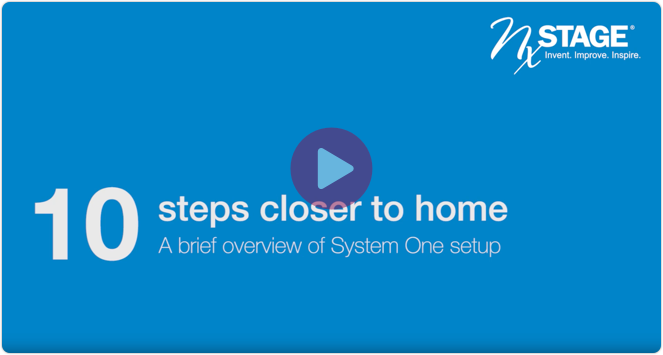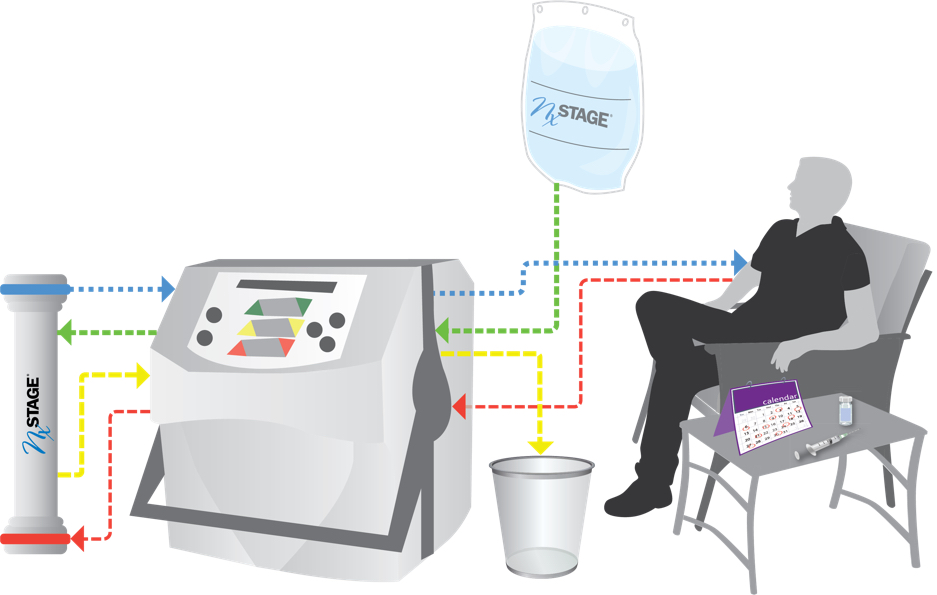How Does System One Work?
The System One is the first and only truly portable hemodialysis system cleared for home hemodialysis in the United States, including solo hemodialysis during waking hours, and nocturnally while the patient and their care partner sleep. It was specifically designed for patients to use in their homes, and is small enough to allow patients to travel and bring their treatment supplies with them.
Treatment Process
Training
A training nurse at your dialysis clinic will train you on how to perform your hemodialysis treatments. Training will also be provided to a care partner, unless the patient and physician both agree that solo home hemodialysis is appropriate.
Once training begins, you will learn how to access your blood, operate the system, monitor your vital signs, administer medication, and learn what to do in the event of a medical emergency. When treating at home, you will have access to the same resources you used during training through both your care team, your NxStage material and NxStage Customer Service and Technical Support. You will be trained using a program called NxSTEPS that includes printed and online training, as well as helpful videos. This training program will help you understand what to expect and how to effectively manage your treatments.
Care Partners
Depending on their prescription, some patients may require a care partner for home hemodialysis. The trained and qualified care partner needs to be present during treatments for support and to act in the event of a medical emergency.
It is important to note that a care partner is not a medical professional. It can be a friend, spouse, relative, neighbor or another individual who is willing to be trained on the system.
Provided that both the patient and physician agree on solo home hemodialysis, having a care partner may not be a requirement to perform treatments. Additional ancillary devices and training are required to perform solo home hemodialysis.
Read more about the role of care partners in our family and friends section.
The reported benefits of home hemodialysis (HHD) may not be experienced by all patients.
The NxStage System is a prescription device and, like all medical devices, involves some risks. The risks associated with hemodialysis treatments in any environment include, but are not limited to, high blood pressure, fluid overload, low blood pressure, heart-related issues, and vascular access complications. When vascular access is exposed to more frequent use, infection of the site, and other access related complications may also be potential risks. The medical devices used in hemodialysis therapies may add additional risks including air entering the bloodstream, and blood loss due to clotting or accidental disconnection of the blood tubing set.
Home hemodialysis with the NxStage System during waking hours may not require a care partner, provided a physician and a qualified patient agree that solo home hemodialysis is appropriate. Patients performing nocturnal treatments are required to have a care partner. Care partners are trained on proper operation and how to get medical or technical help if needed.
Certain risks associated with hemodialysis treatment are increased when performing solo HHD because no one is present to help the patient respond to health emergencies. If patients experience needles coming out, blood loss, or very low blood pressure during solo HHD, they may lose consciousness or become physically unable to correct the health emergency. Losing consciousness or otherwise becoming impaired during any health emergency while alone could result in significant injury or death. Additional ancillary devices and training are required when performing solo HHD.
Certain risks associated with hemodialysis treatment are increased when performing nocturnal therapy due to the length of treatment time and because therapy is performed while the patient and care partner are sleeping. These risks include, but are not limited to, blood access disconnects and blood loss during sleep, blood clotting due to slower blood flow and/or increased treatment time, and delayed response to alarms when waking from sleep.
Patients should consult their doctor to understand the risks and responsibilities of performing these therapies using the NxStage System.






